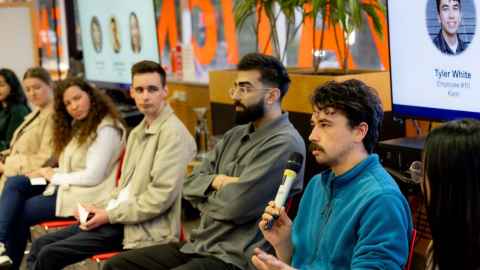What is it really like to work in the start-up space?
15 October 2025
Independent consultant Tyler White shares insights from his career working with founders.

As a high-school student, Tyler White had always harboured a casual interest in entrepreneurship. But as he explored study options at the annual Open Day event hosted by Waipapa Taumata Rau, University of Auckland, he discovered the Velocity programme offered by the Business School’s Centre for Innovation and Entrepreneurship (CIE). It was a game-changer.
“Velocity’s presence at Open Day really put entrepreneurship on my radar as something you could credibly pursue,” White says.
Entering the Velocity Innovation Challenge during the first year of his Bachelor of Engineering/Bachelor of Arts conjoint degree was a no-brainer – and White’s proposal for an online learning platform that enabled high-school students to source academic support for each other, peer-to-peer, took out the top prize.
“It was a serious vote of confidence for me and what I could do with entrepreneurship,” he recalls.
The insights he gained from the experience continue to resonate.
“Velocity showed me it pays to explore interests widely and fervently, without any real plan of where those interests might wind up,” he says. “Those end up being much better starting points for entrepreneurial ventures than trying to directly brainstorm towards a start-up idea.”
The budding entrepreneur put what he had learned into practice when he joined Kiwi edtech start-up Kami as their tenth employee, interning in their customer success and support team while completing his undergraduate degree. Today, Kami is a global leader in digital classroom tools – but in 2018 the venture was virtually unknown, and Tyler admits family and friends viewed his move as “unconventional”.
For him, however, the crash course in entrepreneurship proved pivotal.
“The job was like a real-world capstone project,” he recalls. “I’m still proud of how Kami kept schools running during the first waves of the Covid-19 pandemic. It validated my belief that leading is a team sport. You need to be willing to roll up your sleeves for something bigger than yourself.”
The best thing about working for a start-up?
“Working with founders,” he says. “It’s such a rare and valuable opportunity. Founders have this incredible ability of knowing when to think independently from others. When I joined Kami, I was reporting directly to the CEO and was blown away by his and the rest of the founding team’s ability to take responsibility for problems and make effective calls to deal with them.”
A key takeaway was that success brings as many challenges as rewards.
“People find start-ups appealing because they have a flat hierarchy and they’re small enough for you to influence many things,” he says. “What people need to remember is that the end goal of a start-up is to grow into a large company, and that means managing and leading people. I’d encourage those interested in entrepreneurship to consider how they feel about people management and processes.”
Another piece of advice for aspiring innovators: seek out high-performing environments.
“So much of your ability to think independently and take risks depends on your direct experience and reflection. You get much better results if you know what excellence looks like,” White says.
He is now working as an independent consultant, helping founders find ways of using data as leverage for business growth. He’s enthusiastic about the unique opportunities New Zealand offers innovators.
“We have the benefit of hindsight from other entrepreneurship cultures across the globe that have been on the clock a lot longer than ours,” he says. “And New Zealand is a great place to live. So much of entrepreneurship, especially the high-tech and high-growth variety, is about having great people clustered together. Being a great place to live goes a long way towards achieving that.”
He believes the outlook is positive for entrepreneurs.
“There are awesome success stories coming through in the start-up ecosystem,” he says, citing pioneering agtech venture Halter. “Halter’s Series D capital raise in 2025 marks an inflection point. I’ve heard a fair bit of ‘Maybe I should launch a start-up,’ from folks who didn’t previously think of themselves as entrepreneurs. I’m bullish that more and more people will become entrepreneurs – whether that’s running a one-person business, or creating world-class empires.”
Contact
Questions? Contact the Centre for Innovation and Entrepreneurship for more information.
E: cie@auckland.ac.nz